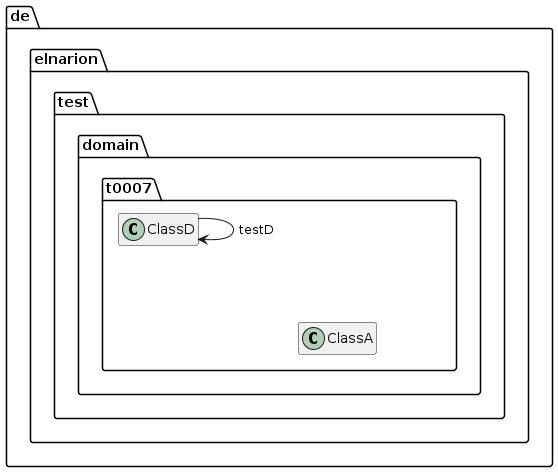hideFields
Description
With this configuration toggle you can hide all fields in the rendered diagram but they are still part of the generated diagram text.
If you want to remove specific fields from the diagram, you have to use the field blacklist regular expression configuration option.
If you want to remove all fields from the diagram completely, you have to use the remove fields configuration option.
Example
In the following example there are three dependencies in the maven dependency hierarchy which build the classpath for all further generation:
<dependencies>
<dependency>
<groupId>de.elnarion.util</groupId>
<artifactId>plantuml-generator-util</artifactId>
<version>@project.version@</version>
<classifier>tests</classifier>
<type>test-jar</type>
</dependency>
<dependency>
<groupId>commons-io</groupId>
<artifactId>commons-io</artifactId>
<version>2.16.1</version>
</dependency>
<dependency>
<groupId>javax.persistence</groupId>
<artifactId>javax.persistence-api</artifactId>
<version>2.2</version>
</dependency>
</dependencies>From this classpath all classes of the package "de.elnarion.test.domain.t0007", which are also used by the JUnit-tests of the PlantUML generator utility, should be generated as class diagram with the following plugin configuration:
<plugin>
<artifactId>plantuml-generator-maven-plugin</artifactId>
<groupId>de.elnarion.maven</groupId>
<version>@project.version@</version>
<executions>
<execution>
<id>generate-simple-diagram</id>
<goals>
<goal>generate</goal>
</goals>
<phase>generate-test-sources</phase>
<configuration>
<outputFilename>testdiagram1.txt</outputFilename>
<scanPackages>
<scanPackage>de.elnarion.test.domain.t0007</scanPackage>
</scanPackages>
<hideClasses>
<hideClasse>de.elnarion.test.domain.t0007.ClassB</hideClasse>
<hideClasse>de.elnarion.test.domain.t0007.ClassC</hideClasse>
</hideClasses>
<hideFields>true</hideFields>
<hideMethods>true</hideMethods>
</configuration>
</execution>
</executions>
</plugin>but all fields and methods and two classes should be hidden in the rendered diagram. This configuration leads to this diagram:

and produces this PlantUML diagram text:
@startuml
class de.elnarion.test.domain.t0007.ClassA {
{field} +fieldA : String
{field} +fieldB : String
{method} +testMethod () : void
{method} +testMethod2 () : void
}
class de.elnarion.test.domain.t0007.ClassB {
}
class de.elnarion.test.domain.t0007.ClassC {
{field} +fieldA : String
{field} +fieldB : String
{method} +testMethod () : void
{method} +testMethod2 () : void
}
class de.elnarion.test.domain.t0007.ClassD {
}
de.elnarion.test.domain.t0007.ClassB --> de.elnarion.test.domain.t0007.ClassA : testA
de.elnarion.test.domain.t0007.ClassB --> de.elnarion.test.domain.t0007.ClassB : testB
de.elnarion.test.domain.t0007.ClassD --> de.elnarion.test.domain.t0007.ClassC : testC
de.elnarion.test.domain.t0007.ClassD --> de.elnarion.test.domain.t0007.ClassD : testD
hide fields
hide methods
hide de.elnarion.test.domain.t0007.ClassB
hide de.elnarion.test.domain.t0007.ClassC
@enduml